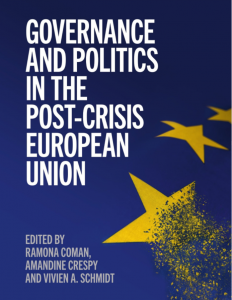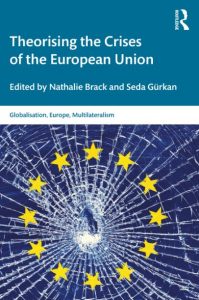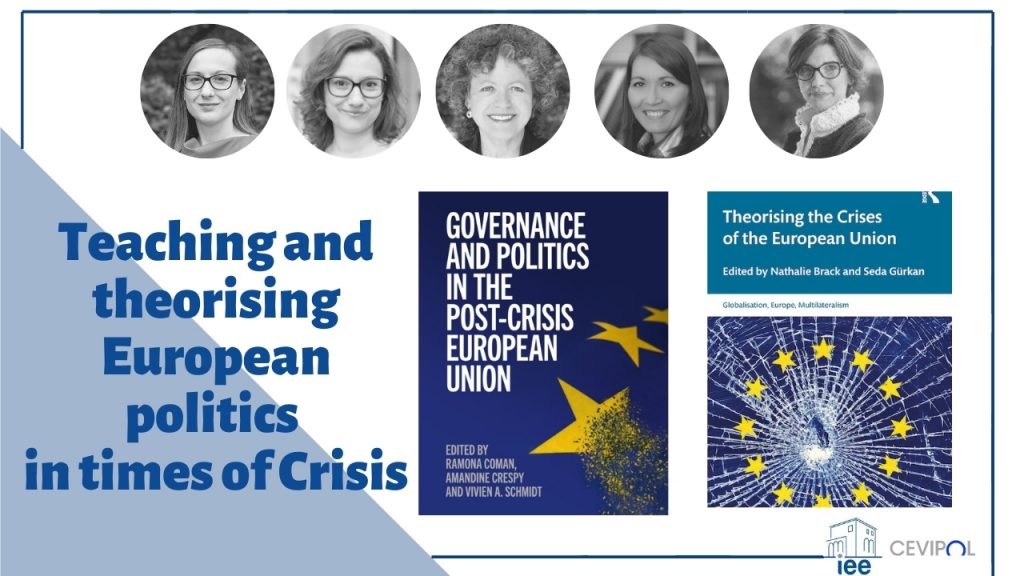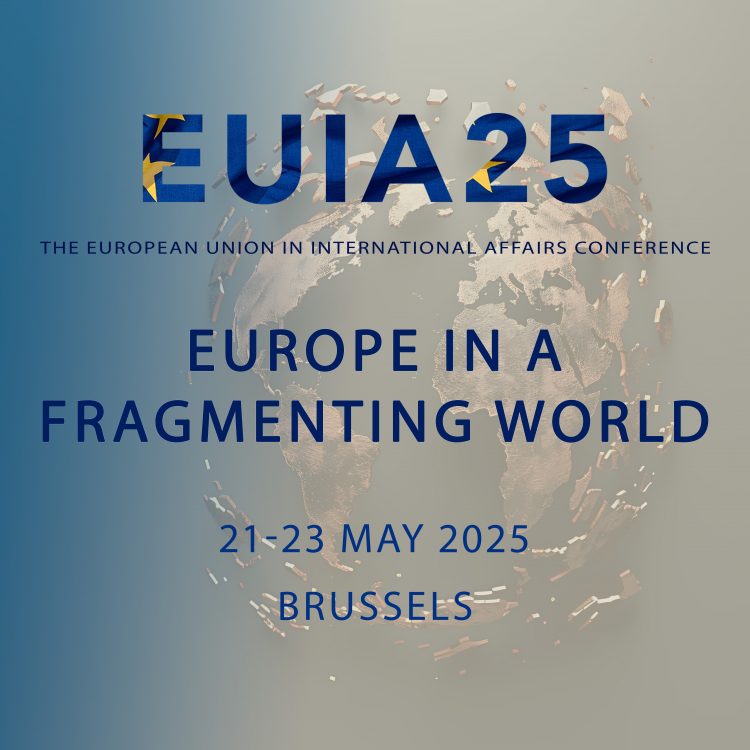Organised by the Institute for European Studies and the CEVIPOL on March 25, 2021, during this double book launch were presented the volume Governance and Politics in the Post-Crisis European Union (Cambridge University Press, 2020), edited by Ramona Coman, Amandine Crespy and Vivien A. Schmidt and Theorising the Crises of the European Union (Routledge, 2021), edited by Nathalie Brack and Seda Gürkan.
Distinguished scholars, Professor Olivier Costa, Director of the Department of European Political and Governance Studies of the College of Europe; Thomas Christiansen, Professor in the Political Science Department at Luiss Università Guido Carli; Clément Fontan, Professor at the Faculty of Economics, Social, Political and Communication Sciences of the Université catholique de Louvain and Celeste Bonnamy, Assistant and PhD researcher in Political Science at the Université Libre de Bruxelles and Université Paris 1 Panthéon-Sorbonne (joint supervision) participated as discussants in the double book launch Teaching and Theorising European politics in times of crisis.
(Re) defining crises
It seems that crisis has been status quo of the European project, at least in the recent past. But when theorising the EU, what are we exactly talking about when we refer to crisis? What is a crisis? How do crises impact the integration process?
For Seda Gürkan, co-editor of Theorising the Crises of the European Union, one of the main intentions of the volume was to reflect on the concept of crisis and to understand what constitutes one as well as to understand how the successive crises have meant for European integration.
Crisis is conceptualised as both an extraordinary, abnormal point in time which alters subsequent decision-making procedures and the routine functioning of the EU, and as a process, this second phase starts when political decisions are made and they, in turn, alter modes of governance.
“A crisis is a situation which compels political actors to adopt new rules, tools, to address this situation. In this way, it leads to change in the dynamics of integration and the shape of the system of governance in the European Union.” Prof. Seda Gürkan, co-editor Theorising the Crises of the European Union.
Among the findings of this volume, Prof. Gürkan points out, on the one hand, that the unfinished nature of the European project has made the EU more prone or vulnerable to crises, and on the other hand, the recent crisis context since 2009, worsened the already existing problems in the European Union.
Crises reshape the EU institutional landscape
In the past decade, the EU has had to face an economic crisis, a so-called migration crisis, terrorism, Brexit, a populist wave and now COVID-19. After studying governance and politics in this context, what can be said about institutional changes or adaptations? Have the solutions to the crises been temporary? Or have the institutions been reshaped permanently by these crises?
The volume Governance and Politics in the Post-Crisis European Union (Cambridge University Press, 2020) seeks, among other aims, to shed light on institutional change both formal and informal, explains Professor Ramona Coman, co-editor.
“Governance and Politics in the Post-Crisis European Union was written in times of great turmoil. It is about how the European Union’s policies and institutions have changed in light of the multiple crises since 2010.” Prof. Ramona Coman, co-editor Governance and Politics in the Post-Crisis European Union.
The book’s contributors, says Professor Coman, show that not only the Maastricht treaty, but also this decade of crises, have put the decision-making processes and modes of governance under strain, and have shifted the balance of power at the EU level. Who holds the power in the European Union in the crisis context, is one of the questions addressed by the book.
Some of the institutional changes tend to become permanent, there is a layering phenomenon, explains Professor Coman. As an example, the role of the European Council in policy debate, implementation and even interfering in the legislative process tends to become permanent.
New tools and concepts to study the EU
Both books are born form an understanding that the existing theoretical framework has been surpassed by the events and that new tools and concepts are needed to study the EU. What are the main novelties?
The two volumes, with their different approaches, share the aim of analysing the recent crises and the impact they have had either on the integration process, on EU studies or on EU policies and politics and to bring a better understanding of the crises, as an event (a point in time) but also as a process and their consequences, explains Prof. Nathalie Brack, co-editor of Theorising the Crises of the European Union (Routledge, 2021).
One of the added values of both texts, continues Prof. Brack, is that both have considered a great variety of crises, as well as a combination, in both volumes, of comparative analysis of the weaknesses and strengths of different theoretical approaches. “By doing so they bring new insight on what’s going on in the EU at the moment and what’s going on in EU studies.”
“Both books call for a dialogue between approaches and subdisciplines in EU studies… And both have a clear ambition to understand the impact and consequences of this decade of crises: they show that there is a transformation of the EU as a political system, of EU politics as well and EU policies. Finally, both books highlight, in their own way, although crises represented a critical juncture for European integration, they were more an accelerator of pre-existing trends.” Prof. Nathalie Brack, co-editor Theorising the Crises of the European Union.
Two tools to understand European integration
Both books put to the fore the recognition that crises are a main driver of integration, says Prof. Amandine Crespy, co-editor of Governance and Politics in the Post-Crisis European Union. Crises have paradoxically become the ‘new normal’, she adds.
Both books show that reactions from elites, but also from citizens, through those crises, shape EU integration in a decisive way, says Professor Crespy.
For her, the volumes are complementary. While “Theorising the Crises of the European Union” focuses on theories, on a ‘reflective moment’ in which European scholars are constrained to revise and assess the relevance of existing theories, “Governance and Politics in the Post-Crisis European Union” tries to capture institutional and policy change but both books emphasise a shift away from overly functional understanding of European integration.
“One common ambition of both books was to stimulate critical thinking, among scholars and certainly among students. We are hoping to mainstream critical approaches to EU integration and to reflect more on the impact of European integration on citizens…” Prof. Amandine Crespy, co-editor Governance and Politics in the Post-Crisis European Union.
The Books
 Governance and Politics in the Post-Crisis European Union (Cambridge University Press, 2020) edited by Ramona Coman, Amandine Crespy and Vivien Schmidt.
Governance and Politics in the Post-Crisis European Union (Cambridge University Press, 2020) edited by Ramona Coman, Amandine Crespy and Vivien Schmidt.
 Theorising the Crises of the European Union (Routledge, 2021), edited by Nathalie Brack and Seda Gürkan.
Theorising the Crises of the European Union (Routledge, 2021), edited by Nathalie Brack and Seda Gürkan.
The discussants
Professor Olivier Costa, Director of the Department of European Political and Governance Studies of the College of Europe; Thomas Christiansen, Professor in the Political Science Department at Luiss Università Guido Carli; Clément Fontan, Professor at the Faculty of Economics, Social, Political and Communication Sciences of the Université catholique de Louvain and Celeste BONNAMY, Assistant and PhD researcher in Political Science at the Université Libre de Bruxelles and Université Paris 1 Panthéon-Sorbonne (joint supervision) shared theirs insights and questions on the volumes.
You can follow their comments and the conversation on our YouTube channel.




